Global Multiple Sclerosis News Network - Insights on EAN's Annual Data Releases in MS
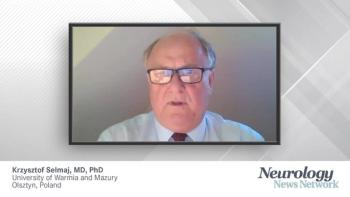
Krzysztof Selmaj, MD, PhD, discusses the treatment landscape for relapsing-remitting multiple sclerosis (RRMS) and where sphinogine-1-phospate (S1P) receptor modulators fit in.

Krzysztof Selmaj, MD, PhD, explains the tissue selectivity of sphinogine-1-phospate (S1P) receptor modulators and the clinical considerations that arise when treating multiple sclerosis (MS).

Krzysztof Selmaj, MD, PhD, discusses the side effects of sphinogine-1-phospate (S1P) receptor modulators, highlighting particular adverse events clinicians should be aware of when treating multiple sclerosis (MS).

Krzysztof Selmaj, MD, PhD, provides his clinical expertise on strategies to monitor patients with relapsing-remitting multiple sclerosis (RRMS) taking sphinogine-1-phospate (S1P) receptor modulators.
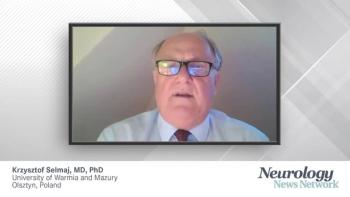
Krzysztof Selmaj, MD, PhD, provides key clinical considerations when switching patients with multiple sclerosis (MS) to sphinogine-1-phospate (S1P) receptor modulator treatment.

Krzysztof Selmaj, MD, PhD, presents the results of a pooled safety study of ozanimod as treatment for relapsing-remitting multiple sclerosis (RRMS).

Krzysztof Selmaj, MD, PhD, presents the key results on the safety of other sphinogine-1-phospate (S1P) receptor modulators, such as fingolimod and ponesimod, in the treatment of multiple sclerosis (MS).
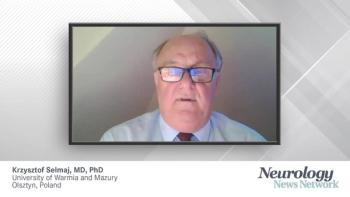
Krzysztof Selmaj, MD, PhD, wraps up this series highlighting strategies for educating patients with relapsing-remitting multiple sclerosis (RRMS) about sphinogine-1-phospate (S1P) receptor modulators.

Bruce Cree, MD, PhD, MAS, discusses the pathophysiology of multiple sclerosis (MS) and how sphinogine-1-phospate (S1P) receptor modulators address the underlying causes. Dr Cree also discusses the differences between the four FDA approved drugs for MS: fingolimod, siponimod, ozanimod, and ponesimod.

Bruce Cree, MD, PhD, MAS, discusses key considerations when selecting one of the four FDA approved sphinogine-1-phospate (S1P) receptor modulators for multiple sclerosis (MS). Dr Cree also highlights a particular adverse event observed in the extension studies of these four S1P receptor modulators.

Bruce Cree, MD, PhD, MAS, reviews the results of the long-term efficacy and safety study of ozanimod, DAYBREAK, in relapsing-remitting multiple sclerosis (RRMS) published last year. Dr Cree also discusses two other safety studies presented at the 2023 European Academy of Neurology (EAN) congress.
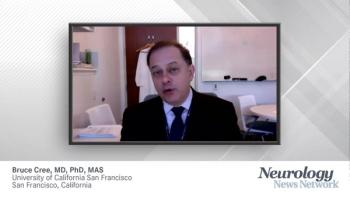
Bruce Cree, MD, PhD, MAS, discusses the data of long-term studies on fingolimod and ponesimod in relapsing-remitting multiple sclerosis (RRMS) and siponimod in secondary-progressive multiple sclerosis (SPMS).

Bruce Cree, MD, PhD, MAS, discusses how sphinogine-1-phospate (S1P) receptor modulators may suppress a patients immune system and key considerations clinicians should make in light of this.

Bruce Cree, MD, PhD, MAS, provides his clinical advice on managing treatment cessation of sphinogine-1-phospate (S1P) receptor modulators while preventing multiple sclerosis (MS) disease rebound.
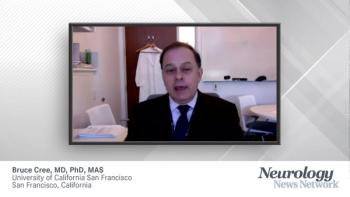
Bruce Cree, MD, PhD, MAS, discusses new data presented at the 2023 European Academy of Neurology (EAN) congress on BTK inhibitors, such as Tolebrutinib, evobrutinib, renibrutinib, and fenibrutinib. Dr Cree also highlights important safety information and adverse events identified in these studies.
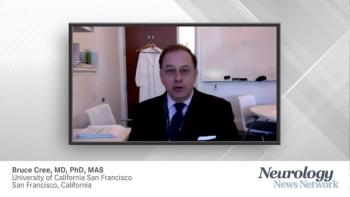
Bruce Cree, MD, PhD, MAS, presents his final thoughts for clinicians on the safety, efficacy, and tolerability of sphinogine-1-phospate (S1P) receptor modulators in the treatment of multiple sclerosis (MS).
















